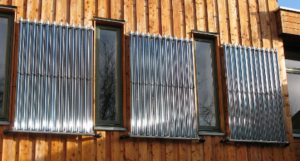Great Britain: Renewable Heating Incentive for Households is slowly revealed
March 26, 2014
The UK Renewable Heating Incentive (RHI) for Households, including assistance for solar thermal, has been announced since 2010 despite the non-household version being launched late in 2011. Positive signs indicate this will now be ready before summer 2014, as the UK government recently passed the relevant draft statutory instrument. This is the result of the consultation process which start in September 2013 based on a proposal of Department of Energy & Climate Change (DECC).
This draft will almost certainly enable government departments to begin organising the launch administration. Despite low take-up of the existing non-household RHI, the industry remains expectant for the domestic version. Upon approaching UK solar thermal companies for their reaction, solarthermalworld found that most companies are keen for the household RHI to begin. Kathy McVeigh, Managing Director of CoolSky, confirms: “I am personally very much looking forward to the RHI being introduced. The financial incentives are attractive for the householder”. In agreement was Stuart Booth, Business Development Manager at WM Sustain, who anticipates the launch “as a sign that solar thermal is at last being appreciated for its merits”.
Fears of high levels of bureaucracy
However, the industry remains wary of the RHI’s extra requirements. One obstacle to accessing the new subsidy lies in the connection between the RHI, the Microgeneration Certification Scheme (MCS), the Standard Assessment Procedure (SAP) and the parallel Green Deal (GD) loan scheme. In particular a GD assessment must be first completed before applying for the RHI. Stuart Booth continues: “The possible downfall is the GD assessment requirement. We’ve had quotes of between GBP 80 and GBP 350 depending on the building, which means that right from the outset customers have to weigh up costs against what they might get back from their investment. As installers, the difficulty is that we need to include the cost of the GD in our quote, but this runs the risk of making us less competitive. In comparison, the (PV) Feed-in Tariff was pretty straightforward. Having the GD has possibly chopped off the legs of the domestic RHI a bit,” Kathy McVeigh shares these concerns: “We are all hoping that the administrative/bureaucratic burden on the installation companies doesn’t cause a barrier to growth”.
RHI has limited scope
Patrick Davies, Technical Director of CoolSky, confirms: “The complexity and bureaucracy of the MCS Scheme seems to expand with every new revision of their standards”. Doug Haigh, Managing Director of Begetube, is much more pessimistic: “Domestic RHI will completely negate everything we do with large solar thermal systems – the new calculation model SAP has to be used to set the solar collector deemed output, and these are outside the scope of SAP”.
While government legislation usually starts by providing a general framework, this time the technical guidance for solar thermal has already been given. The two most important documents referred to by the draft statutory instrument are the MIS 3001 Microgeneration Installation Standard and the MCS 024 Solar Domestic Hot Water Energy Calculation both in the latest version of December 2013.
Errors in the detail
Aspects of these documents have caused some surprise, as this means the technical guidance can no longer be updated without first changing the statutory instrument. This is always much harder to achieve. Already there appear errors and uncertainties: for example, the references to European CEN standards such as EN 12975 that will soon be revised. Patrick Davies adds regarding MCS 024: “Whilst it’s not a very accurate method, it does provide a most basic calculation… It’s a pity that MCS appears to be isolationist in most of its activities and does not engage constructively with this work [of the harmonisation of standards]”. Kathy McVeigh confirms: “The introduction of the Solar Keymark in 2003 helped to ensure end users could trust the quality of solar thermal products tested to that standard and we saw product quality improve drastically from that date onwards… So I personally don’t understand the requirement for separate UK ‘certification’ [such as MCS 004]”.
More information:


